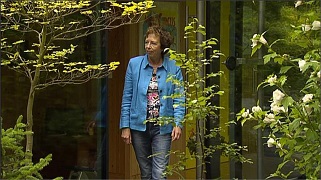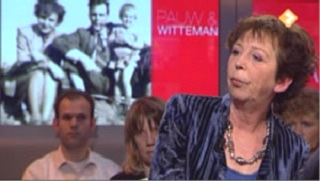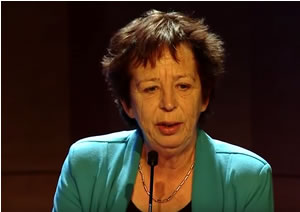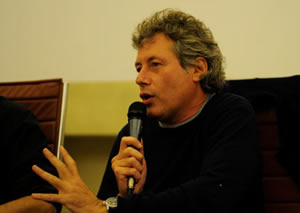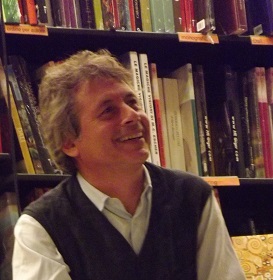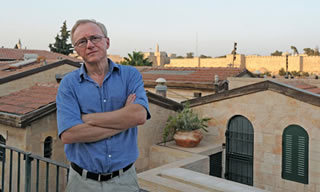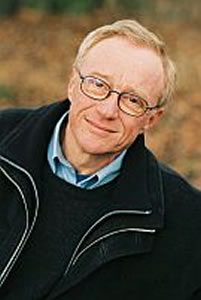De Nederlandse schrijfster Renate Dorrestein werd geboren in Amsterdam op 25 januari 1954. Zie ook alle tags voor Renate Dorrestein op dit blog.
Uit: Dagelijks werk – een schrijversleven
„In de zomer van 2016 had ik een nieuwe koelkast nodig, ter vervanging van het chagrijnige oude beest dat in mijn bijkeuken stroom stond te slurpen. Op dus naar die witgoedwinkel in Haarlem-Noord waar ik eerder zo goed was geslaagd. Omdat het een prachtige middag was en het noordelijke stadsdeel ‘achter het spoor’ mij relatief onbekend was, besloot ik daar na de aanschaf van mijn nieuwe koelkast een wandeling te maken. Het is een stedelijk woongebied, zoals die rond 1900 overal in Nederland zijn gebouwd, met overwegend lage woningbouw en poortachtige toegangen tot de zijstraten.
Al binnen een paar minuten stond ik stil, getroffen door iets wat ik niet eens zozeer zág als wel voelde: ik stond op de locatie waar mijn volgende roman zich zou gaan afspelen.
Je moet al zoveel verzinnen als je een roman schrijft, dus een bestaande locatie biedt in elk geval houvast en grond onder de voeten. Voor iedere schrijver zal het anders zijn, maar voor mij begint alles met die aardende, verankerende plaatsbepaling. Heb ik de plek, dan komt het verhaal vanzelf. Die rare term ‘de plaats van handeling’ is zo gek nog niet. Als ik eenmaal weet wat de plaats van handeling van mijn volgende boek is, dan kom ik al schrijvende ook wel te weten wat die handeling behelst.
Wat mij triggerde op die zonovergoten middag in Haarlem-Noord was dat in één straat de monotonie van eengezinswoningen werd onderbroken door een schoolachtig gebouw dat zich als een schuw dier zo laag mogelijk tegen de stoep gedrukt hield, alsof het aan mijn blik wilde ontsnappen, maar daarmee bereikte het dus het tegendeel. noorder kinderhuis, stond er in de gevel gebeiteld.
Bij die woorden zag ik een ijsvlakte voor me waarover sneeuwvlagen joegen. Ik wist genoeg. Onguurder dan dit ging ik het niet krijgen. Het Noorder Kinderhuis! Mijn god, dat was een plek waar je als kind niet moest zijn!
Ik stak de straat over en tuurde door een raam naar binnen. Er was een doodgewoon hedendaags kinderdagverblijf gevestigd. Maar dat betekende niets. Als je aan dat soort details gewicht toekent, schrijf je nooit een roman. Dit had best sinds mensenheugenis een goelag voor kleine mensen kunnen zijn. Gemene ouders dumpten hier hun nageslacht als ze er genoeg van hadden.
Op slag vlogen wonderlijke namen mijn hoofd binnen. Zebedee, Hosanne, Anne-Eden, de tweeling Michaël en Daniël. Voor mijn geestesoog rees een compleet, kroostrijk gezin uit de Biblebelt op, met van die bleke, langgerekte kinderen die zonder vaccins of mobieltjes door het leven moeten terwijl ze elkaars kleren afdragen en naar bevindelijke zomerkampen gaan. Zo’n gezin met minstens tien kinderen, waarbij niemand het merkt als er opeens een kotertje minder is.”
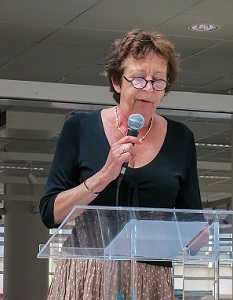
Renate Dorrestein (25 januari 1954 – 4 mei 2018)
De Nederlandse schrijfster Lisa Weeda werd geboren in Dordrecht op 25 januari 1989. Zie ook alle tags voor Lisa Weeda op dit blog.
Uit: Rijskracht
“De laatste keer dat ik mijn vader zag, snoof ik achterin de bus een halve gram coke van de voordeursleutel van mijn ouderlijk huis. Het was zondagmiddag, één uur. Naast me zat een oude dame in een geruite trenchcoat, een paraplu tussen haar benen geklemd. Toen ik met trillende handen het koude ijzer van de met poeder gevulde baard tegen mijn neus perste, keek ze opzij. Ze verschoof niet, had een kalme blik in haar ogen.
‘Zou je dat nu wel doen jongen,’ vroeg ze.
Rustig, alsof ze een in een hoek gedreven kat wilde aaien, legde ze haar rechterhand op mijn bovenbeen. We bleven een tijdje zo zitten. We reden langs boerenbedrijven, voorbij borden ‘aardappelen te koop’, Sjaaks garage. Ik keek de bus rond: altijd dezelfde vriendelijk lachende koppen op de stoelen, een besnorde man achter het stuur. Na tien minuten legde ik mijn hand op die van de vrouw. Ze was oud, maar warm.
‘Ik probeer al een tijd iets te worden,’ zei ik. ‘Maar het wil niet echt. Mijn vrienden zeiden: alleen wat lijntjes in de tentamenweken. Je moet naar de klote gaan om aan de top te komen.’
‘Lukte dat?’
‘Negens, achten. Uitnodigingen voor masterclasses, meelopen op vooraanstaande kantoren.’
‘Waar is je maatpak nu, jongen?’
Alle gekken vallen op een gegeven moment van de rand af. Tuimelen zacht door een glazen wand zonder daarna te zien dat ze aan de andere kant van het glas terechtgekomen zijn. Nog eens keek ze me aan. Ze legde haar andere hand op de mijne, pakte me in, vouwde me klem. Bijna trilde ik niet meer.”
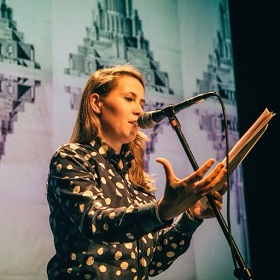
Lisa Weeda (Dordrecht, 25 januari 1989)
De Israëlische schrijver David Grossman werd geboren op 25 januari 1954 in Jeruzalem. Zie ook alle tags voor David Grossman op dit blog.
Uit: Be My Knife (Vertaald door Vered Almog en Maya Gurantz)
“April 7
(Just a few more words.) I sent that letter, came back, and still couldn’t calm down–why should I?–oh, Miriam, please pay no attentionto this fool who’s been smiling uncontrollably since this morning. He’s so happy. He wants right at this minute to take off his clothes, strip off his epidermis, everything, and stand before you bare, right down to the white kernel of his soul. I wish I could paint for you, bray for you, neigh, bark, even whistle for you everything roaring inside me (which reminds me–when I was about twenty, I looked for ways to be a secular version of one of the Righteous Thirty-six. This led to a plan to, at least once a week, sit down on the bus behind a solitary woman, preferably a woman in black widow’s weeds–but you can’t be picky–and, without letting her see me, quietly whistle a love song in her ear that could trip through the outer shell, into her inner ear, and touch everything that was asleep, despaired of, congealed) …
I’m not at all scared that we’re strangers, by the way. On the contrary, tell me, what is more attractive and provocative than the possibility of taking something very precious–the most precious thing–a secret or weakness, or a thoroughly implausible request like the one I made of you, and deliberately placing it in the hands of a total stranger? And then to be tormented by so much shame and disgrace for allowing the beggar in me such a transparent delusion, so that for three days and three nights I spent every moment in self-imposed solitary confinement, a trap … then, just as I was about to give up, stupid, spiteful, gloomy, and gray, all of a sudden your white hand–
Look, maybe you can’t see what excites me so terribly, but your warm, radiant letter, especially the P.S. at the end, that one line–it was as if you came and led me by the hand from shadow into light. That’s how I felt, that you had given me your hand and led me across a watershed of light, it was so simple, as if it was completely natural for a person to do that for a stranger.
(And now, a cold wave. Of all the times, now, just at this moment, and why? Because it was good? A cold wave rising from my stomach, a cold fist rolled up into a ball just under my heart–get acquainted with it.)
Again, please understand I’m really talking about letters only, not a meeting, never a body. No flesh, not with you, your letter made that so clear to me: only words. It would ruin us, being face-to-face, it would immediately take us down into familiar territory. Also, of course, we will keep this strictly secret, we won’t let anybody in on it, so that no one from the outside can use our secret words against us. Only my words meeting yours, so we can feel the rhythm of our breath slowly becoming one.
It makes me so tired to write this way, not a usual fatigue, but after every few lines I really have to stop to take a breath, calm down.”
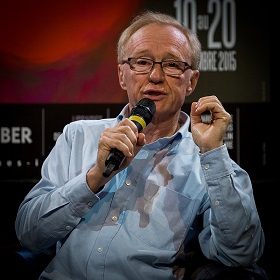
David Grossman (Jeruzalem, 25 januari 1954)
De Engelse schrijver William Somerset Maugham werd geboren in Parijs op 25 januari 1874. Zie ook alle tags voor William Somerset Maugham op dit blog.
Uit: Rain
“It was nearly bed-time and when they awoke next morning land would be in sight. Dr. Macphail lit his pipe and, leaning over the rail, searched the heavens for the Southern Cross. After two years at the front and a wound that had taken longer to heal than it should, he was glad to settle down quietly at Apia for twelve months at least, and he felt already better for the journey. Since some of the passengers were leaving the ship next day at Pago-Pago they had had a little dance that evening and in his ears hammered still the harsh notes of the mechanical piano. But the deck was quiet at last. A little way off he saw his wife in a long chair talking with the Davidsons, and he strolled over to her. When he sat down under the light and took off his hat you saw that he had very red hair, with a bald patch on the crown, and the red, freckled skin which accompanies red hair; he was a man of forty, thin, with a pinched face, precise and rather pedantic; and he spoke with a Scots accent in a very low, quiet voice. Between the Macphails and the Davidsons, who were missionaries, there had arisen the intimacy of shipboard, which is due to propinquity rather than to any community of taste. Their chief tie was the disapproval they shared of the men who spent their days and nights in the smoking-room playing poker or bridge and drinking. Mrs. Macphail was not a little flattered to think that she and her husband were the only people on board with whom the Davidsons were willing to associate, and even the doctor, shy but no fool, half unconsciously acknowledged the compliment. It was only because he was of an argumentative mind that in their cabin at night he permitted himself to carp.
“Mrs. Davidson was saying she didn’t know how they’d have got through the journey if it hadn’t been for us,” said Mrs. Macphail, as she neatly brushed out her transformation. “She said we were really the only people on the ship they cared to know.” 1 shouldn’t have thought a missionary was such a big bug that he could afford to put on frills.”
“If s not frills. I quite understand what she means. It wouldn’t have been very nice for the Davidsons to have to mix with all that rough lot in the smoking-room.” “The founder of their religion wasn’t so exclusive,” said Dr. Macphail with a chuckle. “I’ve asked you over and over again not to joke about religion,” answered his wife. “I shouldn’t like to have a nature like yours, Alec. You never look for the best in people.” He gave her a sidelong glance with his pale, blue eyes, but did not reply. After many years of married life he had learned that it was more conducive to peace to leave his wife with the last word.”
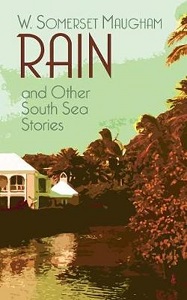
William Somerset Maugham (25 januari 1874 – 16 december 1965)
Cover
De Engelse schrijfster Virginia Woolf werd geboren op 25 januari 1882 te Londen. Zie ook alle tags voor Virginia Woolf op dit blog
Uit: The Diary of Virginia Woolf
“Friday 1 September (1939)
War is on us this morning. Hitler has taken Dantzig: has attacked – or is attacking – Poland. Our P(arliamen)t meets at 6 tonight. This after a day in London, submerged doubts & hopes. Last night we heard terms to Poland read. We then had some hope. Now at 1 I go in to listen I suppose to the declaration of war.
By the early summer of 1940 the Woolfs were much preoccupied with the threat of a German invasion. Leonard told Virginia that he was keeping petrol in the garage for the purpose of committing suicide by carbon monoxide poisoning if Hitler won. Wednesday 15 May
An appeal last night for home defence – against parachutists. L. says he’ll join. An acid conversation. Our nerves are harassed – mine at least: L. evidently relieved by the chance of doing something. Gun & uniform to me slightly ridiculous. Behind that the strain: this morning we discussed suicide if Hitler lands. Jews beaten up. What point in waiting? Better shut the garage doors. This a sensible, rather matter of fact talk. Then he wrote letters, & I too: thanked Bernard Shaw for his love letter. Copied my lecture contentedly. A thunderous hot day. Dutch laid down arms last night. The great battle now raging. Ten days, we say, will settle it. I guess we hold: then dig in; about Nov. the USA comes in as arbitrator. On the other hand –
Mabel just come. She says theyre building wooden bridges beside the others on the Thames. Pop-pop-pop, as we play bowls. Probably a raider over Eastbourne way. Now thunder rain sets in. No, I dont want the garage to see the end of me. I’ve a wish for 10 years more, & to write my book wh. as usual darts into my brain. L. finished his yesterday. So we’ve cleared up our book accounts – tho’ its doubtful if we shall publish this June. Why am I optimistic? Or rather not either way? because its all bombast, this war. One old lady pinning on her cap has more reality. So if one dies, it’ll be a common sense, dull end – not comparable to a days walk, & then an evening reading over the fire. Hospital trains go by. A hot day to be wounded. Anyhow, it cant last, this intensity – so we think – more than 10 days. A fateful book this. Still some blank pages – & what shall I write on the next 10?
This idea struck me: the army is the body: I am the brain. Thinking is my fighting.”
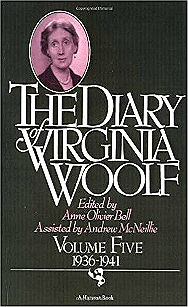
Virginia Woolf (25 januari 1882 – 28 maart 1941)
Cover
De Italiaanse schrijver Alessandro Baricco werd geboren op 25 januari 1958 in Turijn. Zie ook alle tags voor Alessandro Baricco op dit blog.
Uit: Ocean Sea (Vertaald door Alastair McEwen)
“As it is always like this, you need only the glimmer of a man to wound the repose of that which would otherwise be a split second away from becoming truth but instead immediately becomes suspense and doubt once more, because of the simple and infinite power of that man who is a slit, a chink, a small doorway through which return a flood of stories and the enormous inventory of what could be, an infinite gash, a marvelous wound, a path made of thousands of steps where nothing can be true anymore but everything will be — just as the steps are of that woman who, wrapped in a purple cloak, her head covered, is pacing the beach with measured tread, skirting the backwash of the sea, her feet tracing furrows from right to left across what is by then the lost perfection of the great picture, consuming the distance that separates her from the man until she comes to within a few paces of him, and then right beside him, where it takes nothing to pause and silently look on.
The man does not even turn. He continues staring out at the sea. Silence. From time to time he dips the brush in a copper cup and makes a few light strokes on the canvas. In their wake the bristles of the brush leave a shadow of the palest obscurity that the wind immediately dries bringing the pristine white back to the surface. Water. In the copper cup there is only water. And on the canvas, nothing. Nothing that may be seen.
The north wind blows as it always does and the woman pulls her purple cloak closer around her.
“Plasson, you have been working for days and days down here. Why do you carry all those colors around with you if you do not have the courage to use them?”
This seems to wake him up. This hits home. He turns to observe the woman’s face. And when he speaks it is not to reply.
“Please, do not move, he says.”
Then he brings the brush up to the woman’s face, hesitates a moment, rests it on her lips and slowly runs it from one corner of her mouth to the other. The bristles come away tinged with carmine. He looks at them, dips them ever so slightly in the water and looks up once more towards the sea. On the woman’s lips there lingers the hint of a taste that obliges her to think “sea water, this man is painting the sea with the sea” — and it is a thought that brings a shiver.”
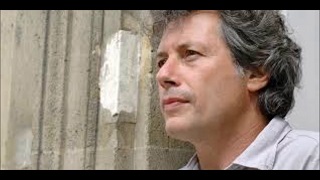
Alessandro Baricco (Turijn, 25 januari 1958)
De Finse dichter, toneelschrijver en uitgever Paavo Juhani Haavikko werd geboren in Helsinki op 25 januari 1931. Zie ook alle tags voor Paavo Haavikko op dit blog.
Uit: No. That’s to say, yes
To begin with, one must note:
There are many wise men. But on the other hand, there is not a single
insane tree.
We are allies, the forest and I, in the sense that the forest is my ally,
and that I am a representative and responsible person.
There are many such alliances in the world.
That is because they have not been studied much.
*
I have written: ‘From the very beginning, the human being has been
designed as a throwaway item. It finds it hard to understand that, since it
did not create itself.’
The human being is a superego. The trees know that.
*
It is hard to communicate with trees because they do not want to speak,
read, count, or lie.
It has become apparent to them that it is difficult to say a single truthful
word without insulting the public or objects.
They do not speak because they do not want to insult or restrain the
public.
They do not want to speak because they are afraid of being understood
by accident.
They do not agree with flight or attack. They have seen war.
The sun might go out if trees started speaking, telling what they have
seen, asking for compensation.
If they were to start asking questions, the questions would turn into
answers. And they would be accurate.
Vertaald door Anselm Hollo
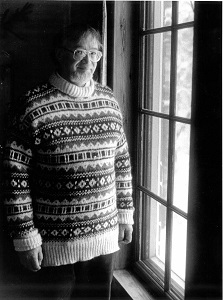
Paavo Haavikko (25 januari 1931 – 6 oktober 2008)
In 1997
De Iers-Britrse schrijver James Gordon Farrell werd geboren op 25 januari 1935 in Liverpool. Zie ook alle tags voor J. G. Farrell op dit blog.
Uit:The Singapore Grip
“There, in those ‘lower depths’ Chinese secret societies undoubtedly performed monstrous crimes, kidnapped their own prominent citizens, fought out appalling territorial battles, stunned themselves with drugs and so forth. If you were merely a visitor, a sailor, say, in those years before the war, Singapore would undoubtedly have seemed no less tawdry, no less exciting than another of the great Eastern sea ports. You would have gone to drink and dance at one of the amusement parks, perhaps even at The Great world itself, whose dance-hall, a vast, echoing barn of a place, had for many years entertained lonely sailors like yourself. There, for twenty-five cents, you could dance with the most beautiful taxi-girls in the East, listen to the loudest bands and admire the glorious dragons painted on the walls. In the good old days, before the troops started flooding in at the beginning of the War, that place could swallow an entire ship’s company and still seem empty except for you and the two or three Chinese girls with dolls’ painted faces sitting at your table, ready to support you with tiny but firm hands should you look like plunging to the floor full of Tiger beer. There, too, when you staggered outside into the sweltering night, you would have been able to inhale that incomparable smell of incense, of warm skin, of meat cooking in coconut oil, of money and frangipani, and hair-oil and lust and sandalwood and heaven knows what, a perfume like the breath of life itself. And from the roof of the Seamen’s Institute, or from some other less respectable roof, you might have seen the huge purple sign advertising Tiger Balm and, beside it, once darkness had completely fallen, its guardian, the great sabre-toothed tiger with glowing orange stripes beginning its nightly prowl over the sleeping roofs of Singapore. But there is no denying it, certain parts of the city were tawdry and others were wretched, and becoming more so as the age advanced: already, by 1940, the walls of cheap hotels and boarding-houses, hitherto impermeable except to an occasional muffled groan or sigh, were becoming porous and beginning to leak radio music, twangings of guitars and news bulletins. Every great city has its seamy side. And so let us look for preference at the gentler parts of the city, at the elegant European suburb of Tanglin, for instance, where Walter Blackett, chairman of the illustrious merchant and agency house of Blackett and Webb Limited, lived with his family At first glance Tanglin resembled any quiet European suburb with its winding, tree-lined streets and pleasant bungalows. There was a golf course close at hand with quite respectable greens; numerous tennis courts could be seen on the other side of sweet-smelling hedges and even a swimming pool or two. It was a peaceful and leisurely life that people lived here, on the whole. Yet if you looked more closely you would see that it was a suburb ready to burst at the seams with a dreadful tropical energy. Foliage sprang up on every hand with a determination unknown to our own polite European vegetation. Dark, glistening green was smeared over everything as if with a palette knife, while in the gloom (the jungle tends to be gloomy) something sinister which had been making a noise a little while ago was now holding its breath.”
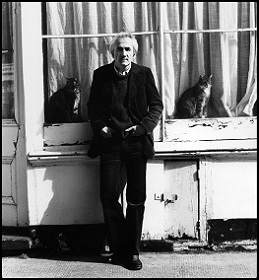
J. G. Farrell (25 januari 1935 – 11 augustus 1979)
De Franse schrijver en journalist Robert Margerit werd geboren op 25 januari 1910 in Brive-la-Gaillarde. Zie ook alle tags voor Robert Margerit op dit blog.
Uit: La Révolution
« Danton ne s’en souciait pas, et ni Robespierre ni Marat ne donnaient aucun signe de le vouloir. Du reste, pensait Claude, il fallait que ses propres recommandations, pour empêcher les Brissotins suspendus de s’enfuir en province, aient été annulées par Marat en personne. Dangereuse mansuétude. Lui-même, bien entendu, ne songeait point à user de rigueur envers ces hommes. Il ne les aurait pas moins retenus très fermement à Paris. On ne surveillait même pas sérieusement ceux qui restaient. Ils correspondaient, recevaient des visites, sortaient, gardés chacun par un seul gendarme. Le ministre Lebrun venait sous l’oeil du sien travailler au Comité de salut public, auquel les Montagnards avaient fait adjoindre Saint-Just, Couthon, Hérault-Séchelles, Ramel, ci-devant de Nogaret, et Mathieu. Ce renfort était bien nécessaire pour lutter contre les ravages du fédéralisme. Aux nouvelles du 31 mai, puis du 2 juin, la province achevait de prendre feu. L’insurrection touchait à cette heure soixante départements. Les rapports que Claude recevait des représentants en mission donnaient le vertige. Robert Lindet, délégué par le Comité pour prendre la situation en main à Lyon, venait de trouver la grande cité entièrement au pouvoir des royalistes alliés aux Brissotins du cru, mandait-il. S’étant rendus maîtres de l’hôtel de ville après un dur combat, ils avaient emprisonné la municipalité montagnarde et se déclaraient en guerre ouverte avec la Convention. Les représentants Roux et Antiboul, chassés de Marseille, faisaient savoir que les Modérés, avec Rebecqui, s’associaient aux aristocrates pour combattre les Jacobins locaux qu’ils arrêtaient par centaines et traduisaient devant un tribunal contre-révolutionnaire. De Bordeaux, les représentants ne pouvaient plus écrire, ils étaient arrêtés. À leur place, des Montagnards signalaient qu’une prétendue commission populaire, évinçant les autorités constituées, en partie complices, avait mis la main sur les caisses publiques, levait des troupes et invitait les départements voisins à se fédérer contre Paris. »
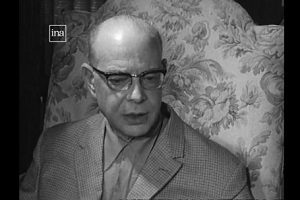
Robert Margerit (25 januari 1910 – 27 juni 1988)
Zie voor nog meer schrijvers van de 25e januari ook mijn blog van 25 januari 2018 en ook mijn blog van 25 januari 2017 en mijn blog van 25 januari 2015 deel 2 en eveneens deel 3.

